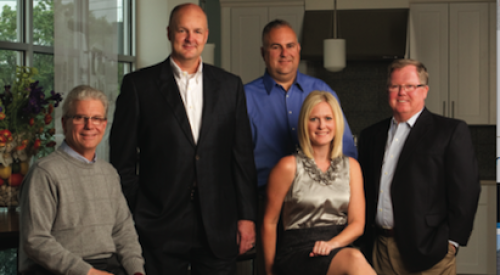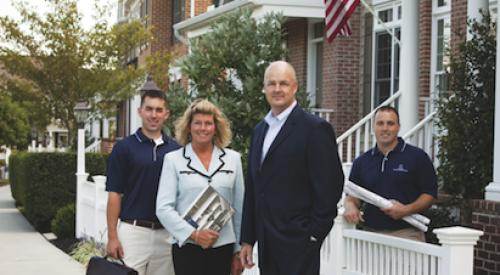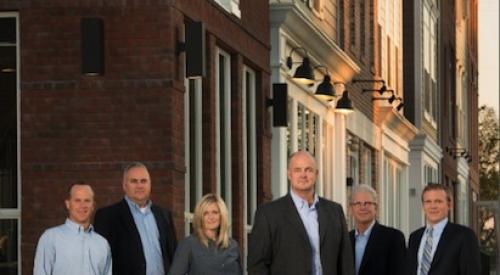| The open floor plan at Engle Homes/Arizona in Phoenix symbolizes the openness employees say they feel. CEO Mark Upton (foreground) launched the division five years ago. |
There are those lucky few people who love the only the place they have worked. Far more common are those who have experienced uninspired workplaces before arriving at a place they love. Heather Stevenson, a senior sales associate with Engle Homes/Arizona, remembers the day four years ago when she interviewed for that job. She was coming off a bad work experience with another Phoenix builder and had a hard time believing the wonderful things she heard from people at Engle about its corporate culture.
“I have been in other offices where everybody looks like they don’t want to be there,” says Stevenson. “It’s not that way when you go through Engle’s office. It is all very positive and motivating.”
Abby Doe, a customer service manager who has been with Engle for three years, attributes much of the company’s success to that culture. In five years Engle Homes/Arizona has gone from no homes or employees to $131 million in 2001 revenue on 580 closings.
“The focus on improvement and positive recognition are the attitudes of choice at Engle, as opposed to finger pointing and finding fault,” says Doe.
Stevenson adds: “Our managers make us feel like we can walk on air. And when we walk on air, we feel like we can go out and sell ice cubes to Eskimos.”
Bill Washburn, a construction vice president who describes Engle’s culture as “clean,” was with two other builders for 10 years before arriving at Engle. He was heartened to see that promotions are strictly merit-based and that the company promotes from within. Before arriving at Engle, it was dispiriting when only “the people who played golf or drank with the boss” tended to get promoted. “There is none of that here.”
At Charter Homes Group in Lancaster, Pa., employees cite teamwork and collaboration as hallmarks of the positive corporate culture. They pride themselves on being associated with one of the most respected and productive builders in the area. In 2001, the company closed on 170 homes for revenue of $41.5 million.
“In sales, believing in your product and your company is a great advantage,” says Charter sales associate Kevin Brown.
Like Brown, construction superintendent Ed Stone, a 12-year employee of the firm, takes pride in the Charter Homes name, but he mostly appreciates the teamwork. “The attitude is, ‘How can I help you do your job better so that we can get a better end result?’”
| Trained as a clinical social worker, Jeanne Torres was drawn to America’s First Home LLP by the opportunity to help prospective buyers re-establish their credit and eventually own their first home. |
The sense of teamwork has always come from the top, says Stone, but he also cites a recently formalized set of rules called The Collaborative Way that puts teamwork at the forefront. With The Collaborative Way as a guide, “we all have come to understand that it is OK to speak up,” Stone says. “We have a tool to communicate problems, and in the end there is less blame and it is a more positive, affirming atmosphere.”
Construction superintendent Greg Hodecker says the teamwork stems from Charter’s drive for customer satisfaction and its inverted pyramid that places home buyers at the top and management at the bottom, a structure also in place at Engle Homes/Arizona.
“We all know that a happy home buyer is the lifeblood of our organization,” Hodecker says. “Everyone in the company works to support the front-line people, the community builder and sales manager. Our unity of purpose comes from that drive to support the team.”
At America’s First Home LLP in Altamonte Springs, Fla., buyer focus also is central to the corporate culture. The firm builds homes for first-time buyers whose low income and credit standing usually are impediments to homeownership. It offers a $350 down payment along with a service to help buyers re-establish credit. In 2001 the firm closed more than 200 single-family homes. This year it’s shooting for 400.
“Knowing that you made it possible for someone who otherwise would not own a home to buy a home for $350 down is awesome,” says director of land acquisitions Terry Day.
Central to the operation is former social worker Jeanne Torres, the credit re-establishment manager. She came to the company a year ago to launch the program, which has been a success. Last year 11% of America’s First Home buyers closed on homes with Torres’ aid. This year it’s running at about 19%.
“What drove me to this company is its mission to help people who are starting over because of different life circumstances,” says Torres, referring to the many America’s First Home buyers with poor credit scores because of divorce or medical bills. “It was the idea that I could use my skills as a clinical social worker to help the customers in another aspect.”
That mission isn’t lost on other employees. “Many people before they come here feel like they’re never going to own a house, or it’s going to be so long before they’ll be able to do so,” closing coordinator Stephanie Knack says. “It’s a good feeling to see such happy customers.”












